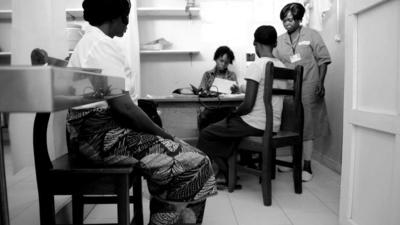A new report from Médecins Sans Frontières/Doctors Without Borders (MSF) uncovers the gaps in services and systems in Papua New Guinea, trapping women and children in cycles of severe family and sexual violence.
'Return to Abuser' details how a dire lack of protection mechanisms, a weak justice system and a culture of impunity endanger the health and lives of patients even if they manage to reach medical care.
Papua New Guinea report findings
The report includes comprehensive data from more than 3,000 survivors of family and sexual violence that MSF treated in 2014-15 in its two projects in both rural Tari, in Hela Province, and the capital, Port Moresby. It reveals the repeated, often escalating, violence women and children endure in the places they should be safe, their homes and communities:
- The vast majority of patients treated (94 percent) were female;
- The most common form of violence (49 percent) was at the hands of partners;
- More than a quarter of these women had been threatened with death;
- Over half (56 percent) of sexual violence survivors were children, and one in six of these (17 percent) were under the age of five;
- Three in four (76 percent) survivors of sexual violence knew the perpetrator;
- One in 10 adult women reported experiencing repeated sexual violence (10 percent). For children, this increased to two in five (38 percent).
Little peace for women in Papua New Guinea
Papua New Guinea (PNG): There is little peace for women caught in a cycle of violence in PNG. Read our new report calling for improved protection for women and girls affected by family and sexual violence: http://www.msf.org.au/article/project-news/return-abuser
Posted by Doctors Without Borders/ Médecins Sans Frontières (MSF) on Monday, 29 February 2016
Despite improvements to address the issue of family and sexual violence in Papua New Guinea, in many areas of the country survivors are left to suffer in silence without access to the care, justice or protection they require.
“Reform of some crucial policies and laws to assist survivors of violence have been achingly slow, with devastating results, particularly for children,” says MSF Country Manager Angelika Herb.
“Without an escalated response from authorities, women will remain trapped in violent relationships, unable to remove themselves or their children from harm; vulnerable minors who are raped or beaten in their homes will continue to be returned to their abusers; and medical assistance, while vital, will be relegated to patching survivors up between abuse sessions,” she added.
Family and sexual violence
The report recommends that authorities increase availability of and access to essential medical and psychosocial services across the country. In particular, MSF calls for increased availability of and access to meaningful protection and alternative accommodation, including ‘safe houses’, so survivors of violence are no longer forced to return to their abusers.
Specific attention must also be paid to the needs of children, including the swift implementation of the Child Welfare Act.
“The severity of the physical and psychological injuries inflicted by family and sexual violence reinforces why Papua New Guinea must guarantee access to free, quality and confidential medical treatment to all survivors. Authorities must urgently ensure the provision of services beyond the medical realm required to keep women and children safe” says Ms Herb.
The report will be launched in Port Moresby on 1 March 2016.
A photo posted by Médecins Sans Frontières (MSF) (@doctorswithoutborders) on
Additional statistics from the "Return to Abuser" report:
- Two in three survivors of violence perpetrated by intimate partners had injuries from weapons, including sticks, knives, machetes and blunt instruments.
- Forty-nine percent of patients who sought care following sexual violence said the abuse – in most cases, rape – occurred at home. The younger the survivor, the more likely it was that they were abused at home.
- For most patients, the perpetrator of sexual violence was someone they knew. The younger the child, the more likely this was, with a known perpetrator involved in the sexual violence against almost nine in ten children younger than five years.
- A family member was the perpetrator for one in ten children in Tari and one in three children in Port Moresby.
- One in ten adult women who sought treatment in the Port Moresby centres following sexual violence reported that the perpetrator was a member of the police or military.
- In Tari, where there is no safe house, one in 15 survivors MSF treated at the Family Support Centre were repeat patients who had been treated by MSF following a previous violent incident. These survivors had no choice but to return home to their abuser after treatment.






